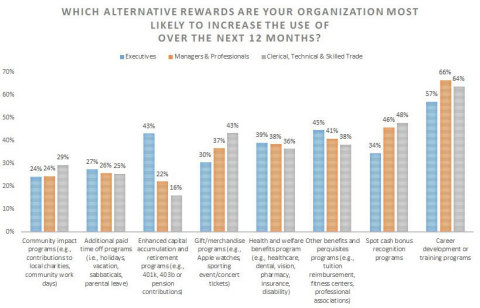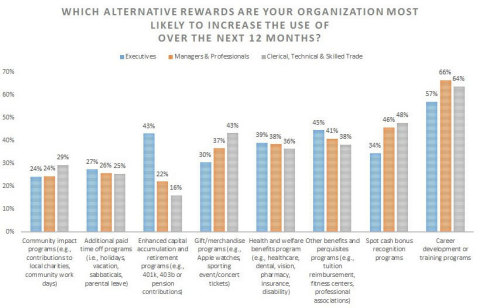LOS ANGELES--(BUSINESS WIRE)--When it comes to rewarding employees above and beyond base salaries, companies are prioritizing career development – more than other alternative rewards, benefits and bonuses, according to new research by the Hay Group division of Korn Ferry (NYSE: KFY), the preeminent global people and organizational advisory firm.
The Value of Alternative Rewards is Clear
Nine in ten organizations (90 percent) surveyed in Hay Group’s recent study employ four or more alternative methods of rewarding employees (including career development programs, spot cash bonuses, health and welfare benefits, enhanced capital accumulation programs, gift/merchandise programs, community impact programs, additional paid time off and other benefits/perquisites programs) as part of their human capital strategy.
More than 8 out of ten organizations surveyed said that alternative rewards are key to being an employer of choice (89 percent), remaining competitive (87 percent) and engaging employees (81 percent). Eighty-seven percent of respondents also agreed that alternative rewards are an important tool in retaining the organization’s existing talent.
At All Levels, Career Development Programs Take Precedence
Over the next year, the vast majority of organizations (71 percent) plan to increase their use of alternative rewards. More than two-thirds of respondents (69 percent) plan to expand their use of alternative rewards at the manager/professional level and below, while the rate is slightly lower for executives, at 53 percent.
Across all employee levels, career development programs are poised to see the biggest expansion in use during 2016. More than half of respondents indicate they intend to expand the use of career development programs across all employee levels, supporting the creation of a stronger bench of employees with the hard and soft skills needed to assume more challenging roles within organizations.
“These findings underscore what we are seeing with our clients and their focus on putting together career development frameworks across the entire organization – from the staff support ranks up to executive levels,” said Tom McMullen, rewards practice leader at Hay Group. “Even within the upper echelons, career—and leadership—development opportunities are critical to developing the competencies that can help elevate employees to the C-suite or prepare them to take on new functional roles.”
Hay Group’s global employee opinion database reveals that a lack of career development opportunities is the number one reason why employees leave organizations. The Alternative Employee Rewards survey findings indicate leaders are elevating and addressing this issue within their organizations and building career development into their broader total rewards strategies.
Cash is King in Linking Employee Recognition to Strategic Business Goals
After career development opportunities, spot cash bonuses are poised to see growing usage in many organizations for functional roles below executive levels, increasing at more than 46 percent of companies, across both manager/professional and clerical/skilled trade employee levels. These programs have grown in prevalence as organizations look to better align their strategic business objectives with employee recognition.
“When it comes to rewards strategies, cash is still king, though the use of financial and non-financial recognition awards is growing,” McMullen explained. “Cash rewards don’t need to come in the form of traditional base salary increases or incentives. Peer-recognized cash awards for ‘caught in the moment’ actions and results by employees are being increasingly offered in response to successful achievement of targeted objectives, such as collaboration, innovation, customer or operational impact.”
On the executive side, much more so than in other employee groups, workers are likely to see expansion and enhancement of capital accumulation, retirement and deferred compensation programs in the next year.
Alternative Rewards Only Poised to Grow in Coming Years
Longer-term, a significant majority of survey respondents (73 percent) agree that the importance of alternative approaches to employee rewards will only increase over the next three to five years, while only 2 percent believe they will decrease in importance. The Hay Group survey results show that leaders recognize the growing importance of a total rewards strategy—going much further than base salary, cash incentives and traditional benefits, to take into account everything of perceived value that the organization offers its employees—to help attract, engage and, particularly, retain talent in an increasingly competitive marketplace.
Please note: This study should be credited to “Korn Ferry Hay Group,” and not “Hay” or “Hays,” which are separate and unrelated organizations.
About the study
The Korn Ferry Hay Group Alternative Employee Rewards study analyzed data from 242 U.S. medium- to large-size organizations, primarily from the HR function. Data was gathered in February 2016.
About Korn Ferry
Korn Ferry is the preeminent global people and organizational advisory firm. We help leaders, organizations, and societies succeed by releasing the full power and potential of people. Our nearly 7,000 colleagues deliver services through our Executive Search, Hay Group and Futurestep divisions. Visit kornferry.com for more information.




